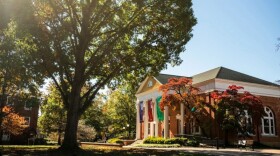UNC Asheville Chancellor Kimberly van Noort is proposing to eliminate several academic programs and departments from the university. According to van Noort, enrollment and tuition declines has led to a current $6 million deficit for the university. This deficit is projected to grow to $8 million next year.
The following programs have been identified for elimination:
- Ancient Mediterranean Studies (degree program and academic department)
- Drama (degree program and academic department)
- Philosophy (degree program and academic department)
- Religious Studies (degree program and academic department)
- French language concentration
- German language concentration
According to van Noort, these programs and concentrations have averaged 25 graduates a year combined. Seventy-two students are currently majoring in the affected programs. UNC Asheville’s student body is about 2,900 undergraduate students.
Over the past five years, UNC Asheville’s enrollment has decreased 25%. This decline has caused a $11.1 million loss in tuition and state enrollment funding.
Last month, van Noort announced she was beginning an academic program review (APR) to address the financial deficit.
“By carefully identifying a number of consistently underenrolled academic programs to be phased out,” van Noort said in a statement Thursday. “The University will ease its budget deficit and free resources for necessary reinvestment in higher-demand programs.”

UNC Asheville is the second university in the UNC System to announce significant program cuts following an APR this year.
In February, UNC Greensboro Chancellor Franklin Gilliam told his campus he was eliminating a total of 20 academic programs, majors and minors.
Chancellor van Noort said UNC Asheville’s APR process will also come with cuts to faculty. In her proposal, she said tenured and tenure-track faculty will receive six to 12 months notice before they are laid off.
Van Noort has already laid off 12 staff members from student affairs, academic affairs and her chancellor’s office.
She and her team have also left vacant positions open as faculty and staff retire or quit, as well as reassigned some employees to different roles. They have also changed the university’s schedule for next semester, so that it “heavily” relies on permanent faculty.
According to van Noort, any students enrolled in discontinued programs should not be impacted and will be able to complete their degrees.
“The university will help students in any affected programs to complete their studies with minimal disruption,” she said.
However, van Noort said she might need to make “additional adjustments” later this year, depending on the university’s fall enrollment. UNC Asheville will have updated enrollment totals by August 30.
This year, almost 2,000 more students applied to UNC Asheville compared to last year.
“We surpassed last year’s record application numbers by 37 percent, with more than 7,600 applications to date,” van Noort said in a campus email. “That’s enabled us to grow the number of admitted students for next fall by 65 percent.”
The university’s retention rate is also its highest in three years, at 90% for spring 2023 students.
But it is too early to know how many of UNC Asheville’s admitted students will also choose to attend the university. Even if a significant number enroll, van Noort said it wouldn’t change the need for program cuts.
“Due to the timing of the enrollment funding appropriations, however, these gains will not immediately contribute positively to the budget,” van Noort said.
In the future, van Noort said she will make academic program reviews more frequent.
“Such reviews should have been — and now will be — a standard part of our academic, financial, and overall institutional planning,” van Noort said in an email to campus.
Chancellor van Noort said she plans to submit her program cuts proposal to the UNC Board of Governors in time for their July meeting. Her submission will also include feedback from department chairs.
“For too long, we didn’t do enough to evaluate and update our academic offerings in line with student needs,” van Noort said in a video statement to campus. “We’re now at a turning point. While not in a crisis, we have a civic and ethical responsibility to reinforce and grow the university for generations of students, families and communities — both today and in the years to come.”
The Board of Governors and UNC System President Peter Hans have to approve van Noort’s proposal before it can be implemented.







